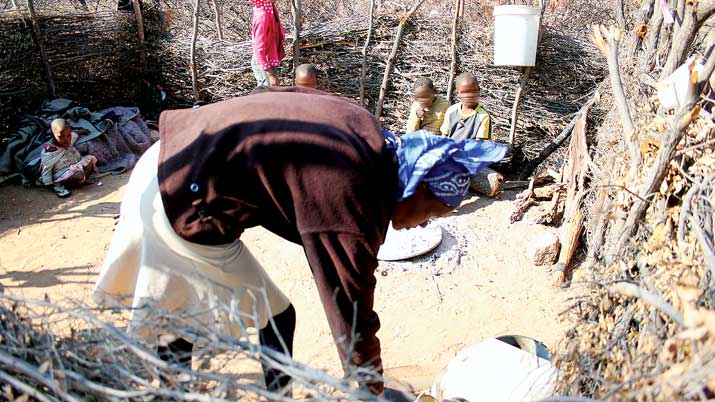It is a chilly winter mid morning inGasugape settlement; a stone’s throwaway from Mogonono village in theKweneng District. This is the home of theKeborupile family. The family epitomisesabsolute poverty, a condition characterizedby extreme deprivation of basic human necessitiessuch as food, safe drinking water,sanitation facilities, health, shelter, educationand information. Keborupile familyclearly lives in abject poverty; an old dilapidatedmud house stands at one cornerof the yard. There is no sign of chicken feettracks on the ground, or a lazy dog baskingin the sun but only a dry empty threelegged pot hanging by the fi replace.
For a moment we thought the family hadrelocated, until we hear faint voices of childrenshouting “ke koloi, koloi!” (It’s a car!car!) coming from the opposite directionfrom which emerged Dipuo Keborupile.She confi rmed to The Gazette team is at herplace of abode where she resides with herboyfriend and their three children, her maternalgrandmother, mother, two siblings andother relatives. Dipuo also indicates that hermother and grandmother have left for Molepoplole.To the eastern side stands a militarytent, housing her two aged paternal aunts. Afew meters to the west is a neatly constructedrectangular structure, about a meter high,made of dried leafy sticks and without a roof.This is the ramshackle she shares with herboyfriend and their children.
At the age of 26, Dipuo has three childrenwhom she candidly admits does not knowtheir ages. “Nna ga ke itse dingwaga tsabone, mme fa o di batla di kwadilwe mo dikaratengtsa bone,” (I don’t know their agesbut if you want them, they are in their medicalcards,) she said.As she narrates the story of her life and thatof her family she begins at the point whereshe left school which was three months afterenrolling for Standard one. “Re ne re sotlega,re ya sekolong re sena ditlhako, unifomo lefa e le diaparo. Gape re ne re sitwa re bo retlogela go ya teng,” (We were poor and goingto school without shoes, uniform and clothes.We felt cold so we dropped out of school,”she narrated her ordeal.
Dipuo admits that her leaving school perhapsrobbed her and her family off graduationfrom poverty. “Ke ikotlhaela gore ke boke tlogetse sekolo ka gore gompieno jaanagongwe ke ka bo ke agela mme ntlo ke morekela dijo. Ga ke bone gore nka bo ke tshelajaaka ke tshela jaana,” she shared with tearyeyes. (I blame myself for having left schoolbecause I could be building my mother andsiblings a house and providing for them. Idon’t think I would also be living the life Iam living now).During the interview, Dipuo revealed toThe Gazette that her mother and four of hersiblings do not have national registrationcards (Omang). This would mean that theyare not in the Botswana’s national registrationsystem and in violation of the law aswell as unable to access government services.
Only her grandmother has an Omang and it isthrough her monthly food basket from governmentthat the whole Keborupile family,including Dipuo’s boyfriend depend on. Sheadmits that her grandmother’s food ration isnot enough and doesn’t last the family long.“We live by asking food from other families.Usually after waking up, I visit myfriends who would then buy me beer since Ilike it,” she said.“Go tlhoka Omang go botlhoko ka gorega gona sepe se ke se itirelang,” (not havingOmang is so painful because there isn’t muchthat I can do for myself), she reiterated, furtherrevealing that even her children do not

